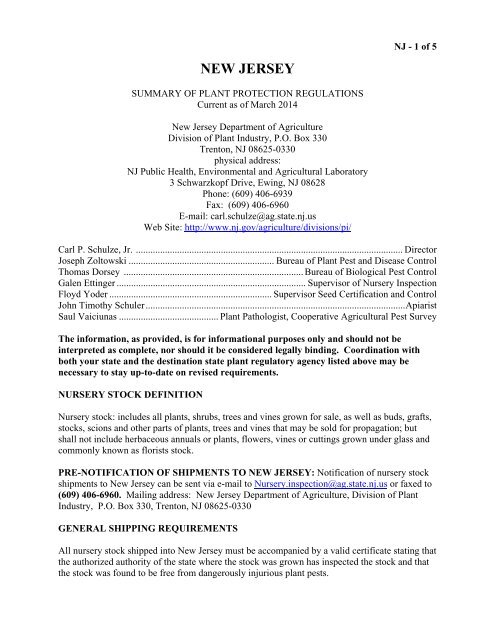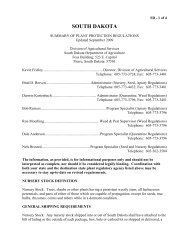NEW JERSEY - National Plant Board
NEW JERSEY - National Plant Board
NEW JERSEY - National Plant Board
Create successful ePaper yourself
Turn your PDF publications into a flip-book with our unique Google optimized e-Paper software.
<strong>NEW</strong> <strong>JERSEY</strong><br />
NJ - 1 of 5<br />
SUMMARY OF PLANT PROTECTION REGULATIONS<br />
Current as of March 2014<br />
New Jersey Department of Agriculture<br />
Division of <strong>Plant</strong> Industry, P.O. Box 330<br />
Trenton, NJ 08625-0330<br />
physical address:<br />
NJ Public Health, Environmental and Agricultural Laboratory<br />
3 Schwarzkopf Drive, Ewing, NJ 08628<br />
Phone: (609) 406-6939<br />
Fax: (609) 406-6960<br />
E-mail: carl.schulze@ag.state.nj.us<br />
Web Site: http://www.nj.gov/agriculture/divisions/pi/<br />
Carl P. Schulze, Jr. .............................................................................................................. Director<br />
Joseph Zoltowski ............................................................ Bureau of <strong>Plant</strong> Pest and Disease Control<br />
Thomas Dorsey .......................................................................... Bureau of Biological Pest Control<br />
Galen Ettinger .............................................................................. Supervisor of Nursery Inspection<br />
Floyd Yoder ................................................................... Supervisor Seed Certification and Control<br />
John Timothy Schuler ........................................................................................................... Apiarist<br />
Saul Vaiciunas ......................................... <strong>Plant</strong> Pathologist, Cooperative Agricultural Pest Survey<br />
The information, as provided, is for informational purposes only and should not be<br />
interpreted as complete, nor should it be considered legally binding. Coordination with<br />
both your state and the destination state plant regulatory agency listed above may be<br />
necessary to stay up-to-date on revised requirements.<br />
NURSERY STOCK DEFINITION<br />
Nursery stock: includes all plants, shrubs, trees and vines grown for sale, as well as buds, grafts,<br />
stocks, scions and other parts of plants, trees and vines that may be sold for propagation; but<br />
shall not include herbaceous annuals or plants, flowers, vines or cuttings grown under glass and<br />
commonly known as florists stock.<br />
PRE-NOTIFICATION OF SHIPMENTS TO <strong>NEW</strong> <strong>JERSEY</strong>: Notification of nursery stock<br />
shipments to New Jersey can be sent via e-mail to Nursery.inspection@ag.state.nj.us or faxed to<br />
(609) 406-6960. Mailing address: New Jersey Department of Agriculture, Division of <strong>Plant</strong><br />
Industry, P.O. Box 330, Trenton, NJ 08625-0330<br />
GENERAL SHIPPING REQUIREMENTS<br />
All nursery stock shipped into New Jersey must be accompanied by a valid certificate stating that<br />
the authorized authority of the state where the stock was grown has inspected the stock and that<br />
the stock was found to be free from dangerously injurious plant pests.
NJ - 2 of 5<br />
NOXIOUS WEEDS<br />
New Jersey does not have a statewide noxious weed list.<br />
QUARANTINES OR ADDITIONAL REQUIREMENTS<br />
VEGETABLE PLANTS<br />
PESTS: Insects and diseases affecting vegetable seedlings<br />
STATES REGULATED: All<br />
MATERIALS REGULATED: Vegetable plants<br />
RESTRICTIONS: <strong>Plant</strong>s must be certified to have been grown under an official<br />
certification program or to have been inspected and found free of insects and disease<br />
no more than 5 days prior to removal from soil.<br />
TOMATO PLANTS<br />
PEPPER PLANTS<br />
PESTS: The late blight fungus (Phytophthora infestans), bacterial spot (Xanthomonas<br />
campestris pv. vesicatoria), bacterial speck (Pseudomonas syringae pv. tomato) and<br />
bacterial canker (Clavibacter michiganensis subsp. michiganensis).<br />
STATES REGULATED: All states where tomato plants are produced for shipment<br />
into New Jersey.<br />
MATERIALS REGULATED: Tomato plants<br />
RESTRICTIONS: <strong>Plant</strong>s must be certified to have been grown under an official<br />
certification program or to have been inspected and found free of insects and disease<br />
no more than 5 days prior to removal from soil. Contact NJ Dept. of Agriculture for<br />
list of requirements.<br />
PESTS: Bacterial spot (Xanthomonas campestris pv. vesicatoria).<br />
STATES REGULATED: All states where pepper plants are produced for shipment<br />
into New Jersey.<br />
MATERIALS REGULATED: Pepper plants<br />
RESTRICTIONS: <strong>Plant</strong>s must be certified to have been grown under an official<br />
certification program or to have been inspected and found free of insects and disease
ROSE PLANTS<br />
NJ - 3 of 5<br />
no more than 5 days prior to removal from soil. Contact NJ Dept. of Agriculture for<br />
list of requirements.<br />
PESTS: Viruses affecting roses<br />
STATES REGULATED: All<br />
MATERIALS REGULATED: <strong>Plant</strong>s of the genus Rosa sp.<br />
RESTRICTIONS: Rose plants shipped into New Jersey must be accompanied by a<br />
certificate stating that the plants were inspected during the growing season and were<br />
found visibly free of plant viruses.<br />
GOLDEN NEMATODE<br />
PEST: Golden Nematode (Globodera rostochiensis)<br />
STATES REGULATED: Infested portions of New York and Canada<br />
MATERIALS REGULATED: Soil, sod and sand<br />
RESTRICTIONS: No soil, including sod, and sand, shall be moved from any area,<br />
known to be infested with Golden Nematode, into the State of New Jersey, except<br />
when fumigated by an approved method and certified as such, or except to<br />
laboratories approved by the Deputy Administrator, <strong>Plant</strong> Protection and Quarantine,<br />
Animal and <strong>Plant</strong> Health Inspection Service, United States Department of Agriculture<br />
for such purposes as set forth in the federal regulation regarding interstate movement<br />
of soil samples containing Golden Nematode for processing, testing or analysis, 7<br />
CPR s. 301.85-3(b).<br />
WHITE PINE BLISTER RUST<br />
PEST: The fungus Cronartium ribicola which causes white pine blister rust.<br />
STATES REGULATED: All<br />
MATERIALS REGULATED: <strong>Plant</strong>s of all species of Ribes and Grossularia.<br />
RESTRICTIONS: Ribes nigrum is only allowed under special permit. Contact NJ<br />
Dept. of Agriculture for list of requirements. The movement of all other species of<br />
Ribes sp. and Grossularia sp. is prohibited into the following townships: Montague,<br />
Sandyston, Walpack and Vernon in Sussex County; West Milford, Ringwood and<br />
Wanaque in Passaic County; Jefferson in Morris County.
NJ - 4 of 5<br />
CERIFERUS (OR JAPANESE) WAX SCALE<br />
PEST: Japanese Wax Scale (Ceroplastes ceriferus F.)<br />
STATES REGULATED: All<br />
MATERIALS REGULATED: Infested hosts of Ceriferus (Japanese) Wax Scale<br />
RESTRICTIONS: The importation of the Ceriferus (or Japanese) Wax Scale is<br />
prohibited.<br />
MEDITERRANEAN FRUIT FLY<br />
PEST: Mediterranean Fruit Fly (Ceratitus capitata)<br />
STATES REGULATED: All<br />
MATERIALS REGULATED: Infested hosts of the Mediterranean Fruit Fly<br />
RESTRICTIONS: The harboring or importation of the Mediterranean Fruit Fly is<br />
prohibited.<br />
AFRICANIZED HONEYBEE<br />
PEST: Africanized Honeybee (Apis mellifera scutellata)<br />
STATES REGULATED: All<br />
MATERIALS REGULATED: Africanized honeybees, fresh or frozen bee sperm,<br />
equipment, shipping and storage containers that have been used at an apiary,<br />
unprocessed comb, vehicles that have been used to carry Africanized honeybees.<br />
RESTRICTIONS: The keeping or importation of Africanized Honeybees in any<br />
stage of development, including honeybees with characteristics identifiable with the<br />
subspecies (Apis mellifera scutellata), regardless of the purity of the genetic strains of<br />
the bees, fresh or frozen bee sperm, equipment, shipping and storage containers that<br />
have been used at an apiary, unprocessed comb, vehicles that have been used to carry<br />
regulated articles, other than fresh or frozen bee sperm, is prohibited.<br />
HONEY BEES AND APIARY EQUIPMENT<br />
PEST: American foulbrood, Varroa mite.<br />
REGULATED AREA: All<br />
MATERIALS REGULATED: All honey bee colonies (including nucs), queens,
NJ - 5 of 5<br />
packaged bees, and used apiary equipment (including honey supers) originating from<br />
a regulated area.<br />
RESTRICTIONS: All colonies, queens, packaged bees and used apiary equipment<br />
shipped into New Jersey must be officially certified by the State of origin to be<br />
apparently free contagious and infectious disease, or arthropod pests at the time<br />
certification. An official certificate of inspection from the regulatory agency in the<br />
State of origin shall accompany each shipment from a regulated area into New Jersey<br />
and shall be valid only for 60 days from the time of inspection. All queens or<br />
package bees shipped to New Jersey shall be accompanied by a federally approved<br />
miticide treatment for the control of Varroa mite.<br />
The certificate of inspection must be mailed/faxed to the N.J. State Apiarist prior to<br />
entry into New Jersey. Contact NJ Dept. of Agriculture for list of requirements.
















